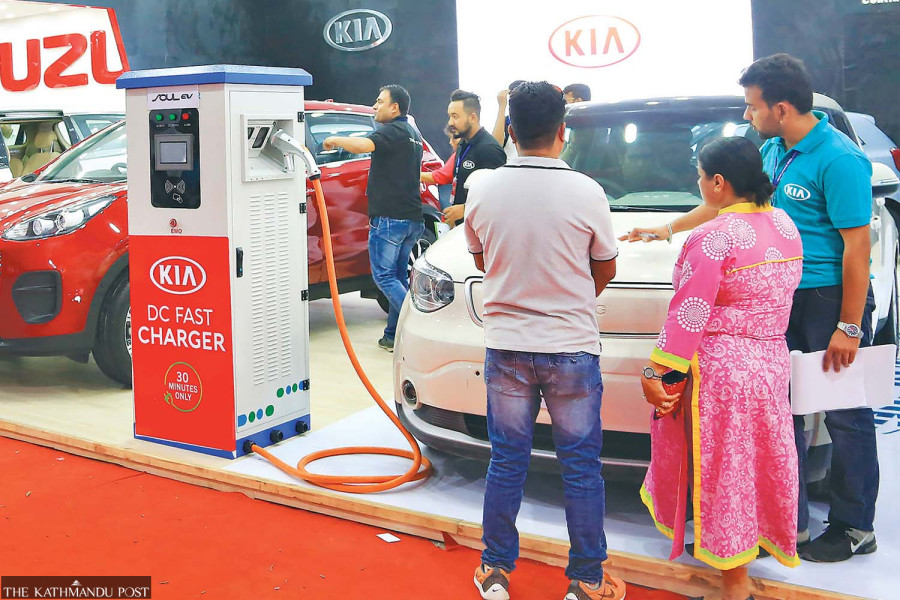Money
EV sales continue to soar despite the overall market slowdown
Nepal imported 2,787 units of battery-powered cars in the first four months of the current fiscal year, up by 174 percent.
Krishana Prasain
Nepal’s automotive market witnessed a massive surge in electric car sales during the first four months of the current fiscal year. Despite an overall slowdown in the economy, the demand for electric vehicles (EVs) has continued to rise.
According to the Department of Customs, Nepal imported 2,787 units of EVs in the review period, up 174 percent.
In terms of value, imports of EVs stood at Rs6.83 billion, up 139 percent.
“The demand for EVs is soaring. Market enquiries are better than expected,” said Dhurba Thapa, president of the Nepal Automobile Dealers’ Association.
According to him, the sales ratio of EVs and internal combustion engine vehicles is now 60:40.
“If this trend continues, EVs will replace petrol-diesel vehicles in no time,” Thapa said.
Insiders say that if the battery life of EVs goes well and adequate infrastructure is built, it may take up to five years to replace the light petrol-diesel vehicles in Nepal.
During the NADA Auto Show this year and festivals like Dashain and Tihar, the enquiries and booking of EVs were high compared to internal combustion engine vehicles, insiders said.
The rising trend towards electric vehicles started last year and is continuing.
People are still testing if EVs can be viable options to combustion engine vehicles while automobile dealers are providing battery warranty of eight years. “It will help to know EVs’ lives soon and also the choice of people,” Thapa said.
Industry insiders say that the government’s preventive measures and rising fuel prices prompted Nepalis to switch to EVs.
Automobile dealers said that affordable prices, banking finance of up to 80 percent and the increasing number of charging stations have been attributed to the boost in EV sales in Nepal.
In the last fiscal year 2022-23, the country imported 10,964 units of four- and three-wheelers worth Rs12.51 billion.
The government has introduced policies to encourage EV adoption.
Unlike fossil fuel-powered four-wheelers, which incur taxes of up to 261 percent, private EV four-wheelers were taxed only 23 percent (10 percent import tax and 13 percent VAT) until the last fiscal year.
However, the government changed its policy in the current fiscal year. The customs duty on EVs below 50 kW is 10 percent. For 50–100 kW EVs, the customs and excise duties are 15 percent and 10 percent, respectively.
For EVs of 100–200 kW, the customs and excise duties are 20 percent each. For EVs in the 200–300 kW range, the customs and excise duties are 40 and 45 percent, respectively. For 300 kW EVs, the customs duty is 60 percent.
Auto dealers say the import boost for EVs is mainly due to easy financing by banks.
Banks are lending up to 90 percent of the cost of the vehicle.
As demand for EVs grows, almost a dozen Indian and Chinese investors have proposed to set up factories in Nepal, the Department of Industry said.
In the last two fiscal years, two Indian and eight Chinese investors submitted proposals to open assembly plants to build two-wheelers, three-wheelers and four-wheelers.
Investors may have been attracted to open EV plants observing Nepal’s lucrative automobile sector.
The budget for the fiscal year 2022-23 has provisioned incentives for companies looking to establish electric four-wheeler plants in the country.
In the last fiscal year, the government announced a 40 percent income tax exemption for five years for electric car assembly units.
Meanwhile, the imports of electric motorcycles and scooters have dropped.
According to the department, Nepal imported 2,100 units of electric motorcycles and scooters worth Rs294.76 million in the first four months of the current fiscal year compared to 3,222 units worth Rs404.27 million in the same period last fiscal year.
The country imported 3,730 units of electric three-wheelers worth Rs370.14 million in the review period compared to 2,841 units worth Rs276,91 million in the last fiscal year.
Likewise, Nepal imported 1,058 unassembled electric three-wheelers worth Rs129.64 million in the first four months of the current fiscal year compared to 348 units worth Rs48.22 million in the same period last fiscal year.




 20.12°C Kathmandu
20.12°C Kathmandu














